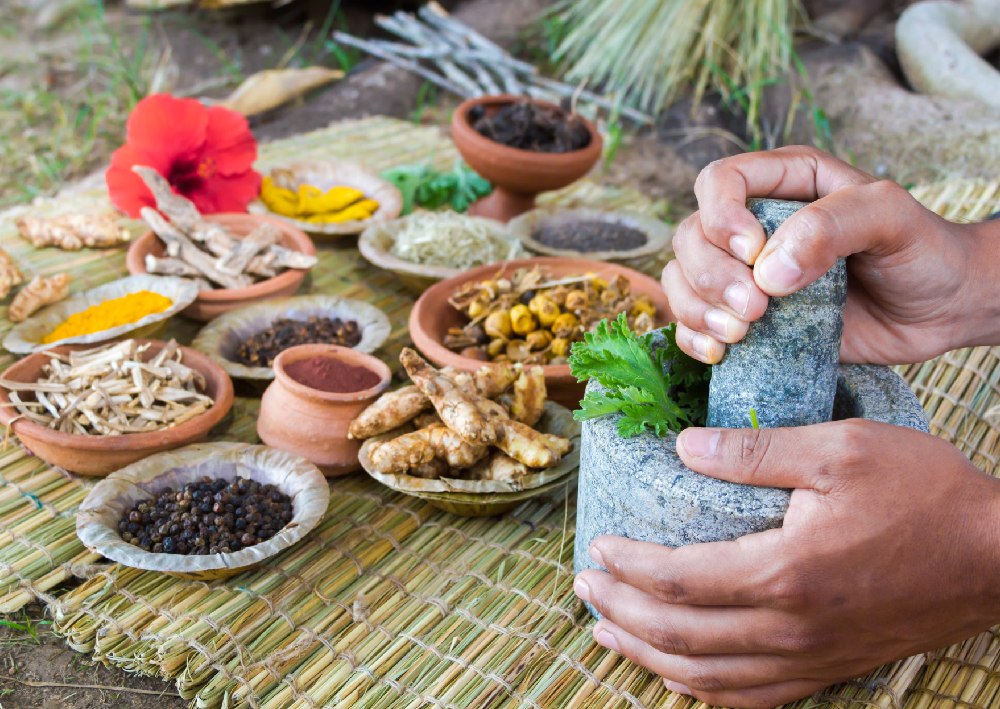In today’s fast-paced world, stress has become an inevitable part of daily life. Whether it’s
work pressure, personal life struggles, or health issues, we often find ourselves overwhelmed
by the mounting stress. While modern medicine offers various solutions, Ayurveda, an
ancient system of healing that originated in India, offers a holistic approach to managing
stress. Rooted in the concept of balance, Ayurveda emphasizes maintaining harmony between
the body, mind, and spirit.
Here’s how Ayurveda can help alleviate stress:
Personalized Treatment Based on Your Dosha
According to Ayurveda, each individual has a unique combination of three doshas: Vata,
Pitta, and Kapha. These doshas represent different elements within the body and mind and
influence our physical, emotional, and mental states. Stress can occur when there is an
imbalance in one or more of these doshas.
- Vata imbalance can lead to anxiety, nervousness, and restlessness.
- Pitta imbalance is associated with irritability, frustration, and anger.
- Kapha imbalance can manifest as sluggishness, depression, and fatigue.
Ayurvedic practitioners can determine your dosha and recommend treatments tailored to
restore balance. This personalized approach can help you manage stress more effectively and
support your overall well-being.
Herbal Remedies to Calm the Mind
Ayurveda has a rich history of using natural herbs and plants to support mental health and
stress relief. Some common herbs used in Ayurvedic medicine include:
- Ashwagandha: Known as an adaptogen, ashwagandha helps the body adapt to stress and promotes calmness. It has been shown to lower cortisol levels (the stress hormone) and enhance overall mood.
- Brahmi: This herb is considered a brain tonic in Ayurveda. It improves mental clarity, enhances memory, and helps in reducing anxiety and stress.
- Tulsi (Holy Basil): Often called “the queen of herbs,” tulsi is revered for its ability to reduce stress, enhance vitality, and promote emotional balance.
These herbs, when consumed in the form of teas, powders, or supplements, help to soothe the
nervous system and promote a calm, peaceful mind.
Meditation and Breathing Techniques (Pranayama)
Ayurveda places a significant emphasis on mental and emotional well-being. One of the key practices in Ayurvedic stress relief is meditation. Meditation helps center the mind, reduce anxiety, and promote mindfulness. Practices like Pranayama, or controlled breathing, are also used to manage stress effectively. Techniques such as Nadi Shodhana (alternate nostril breathing) and Ujjayi (victorious breath) can calm the mind, increase focus, and reduce the body’s stress response.
Abhyanga (Ayurvedic Massage)
Abhyanga is a traditional Ayurvedic massage that involves the application of warm oils to the body. The oils are usually chosen based on your dosha and can include ingredients like sesame oil, coconut oil, or herbal-infused oils. The massage is designed to nourish the skin, stimulate circulation, and calm the nervous system.
Abhyanga not only helps in relaxing the muscles but also soothes the mind. Regular Ayurvedic massages can promote a sense of relaxation, help release tension, and reduce the physical symptoms of stress, such as headaches, muscle tightness, and fatigue.
Balanced Diet to Support Mental Health
Ayurveda emphasizes the importance of food as medicine, and a balanced diet plays a crucial
role in managing stress. Eating in harmony with your dosha and choosing foods that nurture
your body and mind can help reduce stress and anxiety.
- Vata individuals should avoid cold, dry, and light foods. They are encouraged to eat warm, grounding foods like soups, stews, and whole grains to calm their nerves.
- Pitta individuals should focus on cooling foods like cucumbers, melons, and leafy greens. Foods with a bitter or sweet taste are recommended to balance their fiery temperament.
- Kapha individuals benefit from light, warm, and stimulating foods such as spicy dishes, vegetables, and legumes to increase energy and reduce lethargy.
Incorporating fresh, whole foods, herbs, and spices into your meals, such as turmeric, ginger,
and cinnamon, can help support your digestive system and improve overall mental clarity.
Lifestyle Practices for Stress Reduction
In addition to diet and herbal treatments, Ayurveda promotes certain lifestyle practices to
manage stress effectively. These practices aim to bring balance and harmony to both your
body and mind.
- Regular Sleep: Ayurveda stresses the importance of a consistent sleep routine. It is recommended to go to bed early, around 10 p.m., and wake up early to align your body’s natural circadian rhythm. Adequate rest is crucial for mental and emotional well-being.
- Exercise: Gentle exercises like yoga, walking, or swimming are encouraged to keep the body fit and release pent-up tension. Yoga, in particular, is a powerful tool for stress relief, as it integrates the body, mind, and breath.
- Time in Nature: Spending time outdoors, especially in peaceful natural surroundings, helps reduce mental fatigue and anxiety. Ayurveda emphasizes connecting with nature for healing and balance.
Detoxification (Panchakarma)
Panchakarma is an Ayurvedic detoxification treatment that helps remove toxins from the body and restore internal balance. During this process, a combination of massages, herbal steam treatments, and dietary changes are used to cleanse the body and mind. Panchakarma helps in rejuvenating the body, calming the nervous system, and eliminating the stress-related toxins that accumulate over time.
Conclusion
Stress is an inevitable part of life, but Ayurveda offers a holistic, natural way to manage and reduce it. By focusing on a balanced diet, personalized treatments, herbal remedies, and mindfulness practices, Ayurveda helps restore harmony to the body, mind, and spirit. Whether through gentle yoga, herbal supplements, or an Ayurvedic massage, the principles of Ayurveda can provide effective and long-lasting relief from stress.
Incorporating Ayurvedic practices into your daily routine can not only reduce stress but also improve your overall health, leading to a more balanced and fulfilling life.
